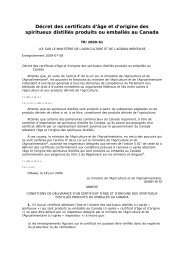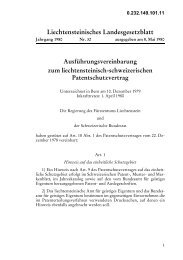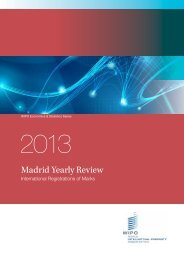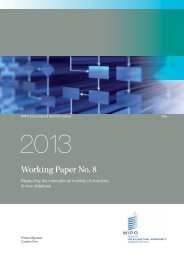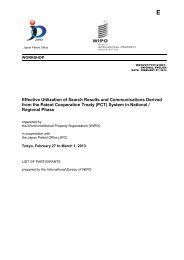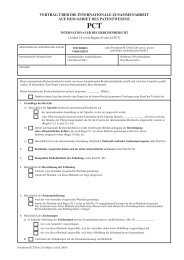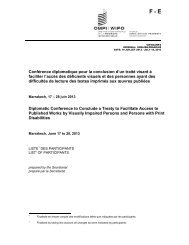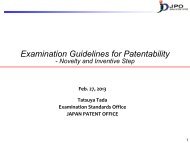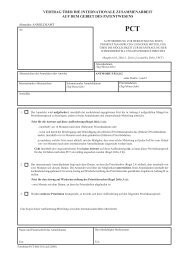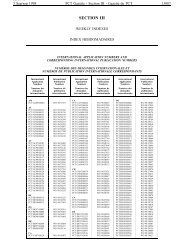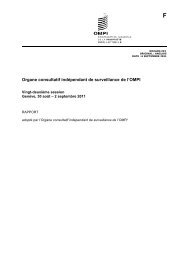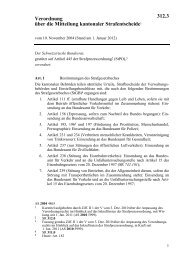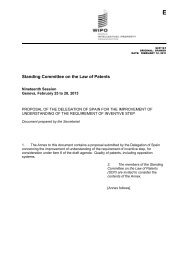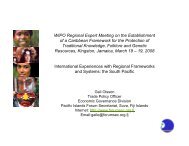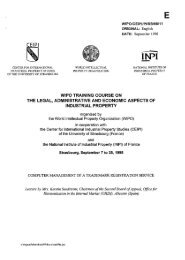WIPO Magazine, Issue No. 2, 2002
WIPO Magazine, Issue No. 2, 2002
WIPO Magazine, Issue No. 2, 2002
- No tags were found...
Create successful ePaper yourself
Turn your PDF publications into a flip-book with our unique Google optimized e-Paper software.
PROMOTING IPIN PUBLICADMINISTRATIONS7<strong>WIPO</strong> <strong>Magazine</strong>/February <strong>2002</strong><strong>WIPO</strong> took a novel approach to thepromotion of intellectual propertyby stressing the role that publicadministrations can play in thisarea during a workshop in HongKong, Special Administrative Region(SAR), China from December12 to 14. The workshop examinedthe relationship between the intellectualproperty system and variousaspects of public administration,and explored measures forimproving awareness of the intellectualproperty system and its rolein national development.The workshop, organized by <strong>WIPO</strong>in cooperation with the IntellectualProperty Department (IPD) and theCivil Service Training and DevelopmentInstitute (CSTDI) of theGovernment of Hong Kong SAR,attracted some 26 foreign and 20local participants.The workshop got underway witha keynote speech by <strong>WIPO</strong> DeputyDirector General Rita Hayes thathighlighted the most recent developmentsin the intellectual propertyarena. An introduction to intellectualproperty, <strong>WIPO</strong>, and itstreaties was also provided.The workshop explored the followingthemes:wpromoting intellectual propertyprotection and management: therole of the public service;wwwwwwidentifying and maximizing publicintellectual property assetsand minimizing the risk of intellectualproperty infringement;enforcement of intellectualproperty rights;intellectual property rights ofgovernment in contracts;enhancing compliance with theintellectual property system bythe public service;developing web-based resourcesfor public sector intellectualproperty training;policy and strategy considerationsfor public service educationand training in intellectualproperty.Speakers in the workshop stressedthe need to identify and maximizepublic intellectual property assetsand to minimize the risk of infringement,noting that in many developingcountries research and developmentactivities are still verymuch in the hands of the publicsector. They noted that, as governmentis still a major investor in researchand development activitiesin public universities and researchinstitutions, it is crucial to create asupportive environment for theseactivities. This includes makingpublic intellectual property assetsrelevant to industries and the public,providing incentives for inventiveactivities, as well as creating a”critical mass” of intellectual propertyliterate citizens through awarenessbuilding.Discussions on the aspect of intellectualproperty rights in governmentcontracts included cautionarymeasures for the public service,i.e., developing means to minimizethe risk of infringement of intellectualproperty rights of others andto promote intellectual propertycompliance in contracts.The experience of the public servicesof the government of HongKong SAR was discussed as an exampleof how to enhance compliancewith the intellectual propertysystem. The IPD lauched an intellectualproperty compliance officerscheme in January 2000, underwhich, within the cadre system ofthe government, the heads of departmentsappointed about 150compliance officers with the objectiveof promoting awareness withinthe government and ensuring compliancewith intellectual propertystandards and guidelines.¨Conference participantsin Hong Kong



